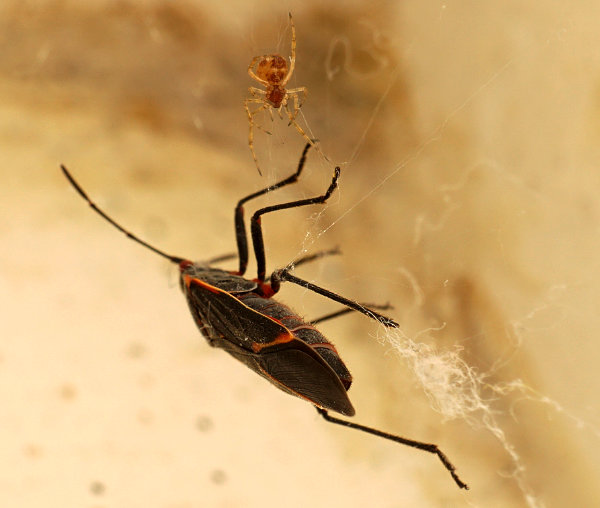Agave neomexicana
Photograph by Ron Wittmann.

Photograph by Ron Wittmann.

![[Image of 3I/Atlas]](/uploads/2025/3I-ATLASa.png)
On November 29, Answers In Genesis apologist and astronomer Danny Faulkner posted an article on the interstellar comet 3I/ATLAS. Dr. Faulkner’s article sensibly dismissed popular speculation (including persistent claims by Harvard professor Avi Loeb) that 3I/ATLAS and similar objects might be artificial probes or alien artifacts. But in doing so, Faulkner never addressed the only question that is cosmologically relevant for a young-earth framework: Where did this object come from? Interstellar comets are not curiosities or distractions; they are kinematic probes: natural test cases for any model purporting that the universe is only a few thousand years old.
For an organization that claims to be able to give “Answers” about what they call “origin science”, Answers In Genesis is suspiciously quiet about the origins of interstellar comets.
Ever since the rise of wide-field astronomical surveys, astronomers have kept a vigilant watch on the skies for near-Earth objects (NEOs): asteroids and comets whose orbits may bring them close to the Earth, with potential risk of impact. But beyond planetary defense, surveys also catalog a broad variety of small bodies because these minor objects carry clues about the formation and evolution of planetary systems: their orbits, compositions, and dynamics help scientists trace back when and how they formed, and how stable their source systems remain.
Comets in our solar system come in different flavors. Short-period comets have orbits closely bound to the Sun, often returning every few years or decades, typically originating in the Kuiper Belt or closer. Long-period comets have highly elongated but still bound orbits, often taking thousands or millions of years to complete (usually thought to arise in the distant Oort Cloud). Both of these types remain gravitationally bound to the Sun, albeit with very different orbital periods. A third, much rarer category — hyperbolic or interstellar comets — follows an unbound trajectory. Their eccentricity exceeds 1, placing them on a one-time pass through the Solar System: they arrive from interstellar space, swing past the Sun, and then depart forever.
In 2025, the world encountered only the third such confirmed interstellar visitor. The first was 1I/ʻOumuamua, discovered in October 2017, followed by 2I/Borisov, announced in August 2019. The newest, 3I/ATLAS, officially designated C/2025 N1 (ATLAS), was discovered this July by the Asteroid Terrestrial-impact Last Alert System (ATLAS) telescope in Chile. Follow-up observations soon confirmed its extremely hyperbolic orbit. Because 3I/ATLAS is active (i.e., showing a fuzzy coma and dust tail, like a “normal” comet) astronomers treat it as a genuine cometary body, not a rocky asteroid.
Dr. Danny Faulkner has become the predominant AIG author and speaker on issues of astronomy since the departure of Dr. Jason Lisle some years ago, writing on topics ranging from light-travel-time and starlight problems to extrasolar planets, dark matter and dark energy, planetary system formation, and the operation of modern astronomical instruments like the James Webb Space Telescope. Over the years, he has articulated a reasonably consistent set of commitments in his elucidation of a “Biblical” cosmology. In defense of a recent special creation, he has argued that divine creation is characterized by stability and order, even using this perceived order as evidence for divine design.

Another shot of a box elder bug below the fold:

I recently came across this fascinating book, Darwin Comes to Town: How the Urban Jungle Drives Evolution, by the biologist Menno Schilthuizen of the Naturalis Biodiversity Center and the University of Leiden. Years ago, probably about when it appeared in 2001, I read Prof. Schilthuizen’s equally fascinating book, Frogs, Flies, and Dandelions, about the origins and definitions of species (indeed, the difficulty of defining species at all). So naturally I snapped up Darwin Comes to Town. The title is a pun, in that the book is about the evolution of organisms that have either adapted to cities or towns, or have adopted cities or towns. I will not review the book, but will pen 3 or 4 paragraphs about chapters that for one reason or another especially interested me. If you want more, read the book!
![[Master Tom in Sydenham]](/uploads/2025/Master_Tom.png)
The Discovery Institute’s website “Science and Culture” (formerly Evolution News and Views) had a dramatic story of conversion recently. A post entitled “He Taught Darwinism for Decades (Then Changed His Mind)” by Andrew McDiarmid on 30 October 2025. It announced that
For decades, British professor and author Neil Thomas was a card-carrying Darwinist. It wasn’t until after he retired from academia that he had the repose to think about things objectively. Then one day, in a scientific flash of inspiration, he came to the conclusion that the standard Darwinian story was “rubbish.”
The result is that Neil Thomas has written two books, published by the DI’s publishing outfit, Discovery Institute Press: Taking Leave of Darwin: A longtime Agnostic Discovers the Case for Design and False Messiah: Darwinism as The God That Failed. He has also made numbers of posts at Science and Culture since 2021, see them here. He was intervewed in a two-part (part 1 and part 2) series by Jonathan Witt in 2021 and by Andrew McDiarmid in 2025. in the DI’s series “ID The Future”.
Thomas cannot understand how biologists ever believed Darwin’s mechanism of natural selection. So: has someone who has been devoted to teaching biology students about Darwin and natural selection recently changed his mind? If so, should we pay close attention to his arguments?
Well …